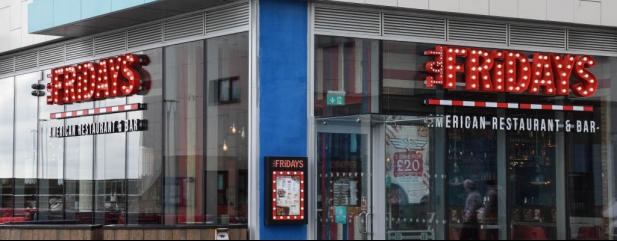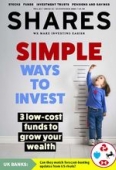Archived article
Please note that tax, investment, pension and ISA rules can change and the information and any views contained in this article may now be inaccurate.
Electra break-up could offer big upside

Private equity trust Electra (ELTA) is entering the final stretch in its strategy to sell off assets, which include controlling interests in Fridays (74% of NAV (net asset value)) and Hotter Shoes (10% of NAV).
Fridays (formerly branded TGI Fridays) is an iconic American themed restaurant and cocktail bar, while Hotter Shoes is a digitally-led shoe manufacturer with a focus on customised comfort.
The trust has announced plans to demerge Fridays and list it on the main market, with trading due to start on 2 November for the the parent company Hostmore. The new entity will include 63rd +1st, a new city-based cocktail-led bar and restaurant brand.
Subject to shareholder approval, Electra will cease to be an investment trust and relist on AIM as the parent company for its remaining corporate asset, Hotter Shoes, renaming itself Unbound Group.
Electra estimates shareholders will experience a single-digit dilution after it relists on AIM, meaning shareholders will own slightly less of Unbound than they do currently.
Investors in Electra who decide to hold onto their shares will end up with shares in the two separately-listed entities.
Electra valued the two businesses at £146.2 million and £19.2 million respectively at the half year results in May, reflecting values estimated at 31 March, before the reopening of hospitality.
If Hostmore was spun-out at the latest valuation held on Electra’s books (£146.2 million), Electra’s market capitalisation would fall by that amount following the listing.

IS THERE VALUE IN HOLDING ONTO ELECTRA SHARES?
The trust’s shares trade at a premium to NAV, implying the potential value of the two remaining businesses could attract higher market values when they trade separately.
Before looking at the fundamentals of the two businesses it’s worth pointing out that academic research shows spin-offs and demergers have historically delivered better than market returns to shareholders.
Since management last valued the businesses, there has been a strong rebound in economic activity and the hospitality has re-opened.
We already have a good idea of the magnitude of the rebound thanks to positive trading updates from the likes of all-day bar/restaurant operator Loungers (LRGS:AIM) and Wagamama owner Restaurant Group (RTN), with both companies flagging significant pent-up demand.
Hostmore itself saw a return to pre-pandemic levels of trading for the 16 weeks from 17 May after indoor dining was permitted, ahead of the underlying market according to the Coffer CGA business tracker.
The company reported like-for-like sales growth of 11% for the period compared with 2019 while in the seven weeks after all restrictions were lifted on 19 July like-for-like growth accelerated to 12.1%.
That said, management’s £146.2 million valuation of Hostmore is close to the £141.4 million it placed on the business in 2019 before the pandemic.
But, as ever, investors are more concerned about future growth and profitability. As it happens, management has provided a range of scenarios for revenues and earnings.
The base case assumes no revenue growth or market share gains, but due to operational efficiencies and cost savings made under new management earnings before interest, taxes, depreciation and amortisation or EBITDA increases 28% to £32.7 million.
With a risk of regional virus flareups and restrictions lingering in the background, that may seem prudent. But as management point out there is also a good opportunity for growth given the significant reduction in capacity in hospitality over the last 18 months.
Under the most optimistic scenario, Hostmore could deliver 10% like-for-like revenue growth which bolsters EBITDA by 61% to £41.3 million.
PEER GROUP ANALYSIS
When Hostmore begins trading investors will naturally want to compare its valuation and prospects to other firms in the sector.
A common way to compare companies is to look at the ratio of EV or enterprise value to EBITDA, which compares the value of a business to its cash flows. Enterprise value represents the total value of a company including market capitalisation and debt.
According to Electra, the latest net debt figure for Hostmore
was £36.4 million in August which added to its £146.2 million market cap gives an EV of £182.6 million.
This means Hostmore will trade on a forward EV to EBITDA ratio of between 5.6 times using the base case EBITDA number and 4.4 times under the best case scenario, which looks unusually low against its peer group.
Using historical EBITDA Hostmore would trade on a ratio of seven times, that is an EV of £182.6 million divided by £25.6 million of cash flows.
Research firm Edison estimates a peer group comprised of Loungers, Restaurant Group and Franco Manca operator Fulham Shore (FUL:AIM) trades on an average EV to EBITDA multiple of 13 times, implying significant upside for Hostmore shares post demerger.

HOTTER SHOES (UNBOUND GROUP)
Hotter is the UK’s largest shoe manufacturer, known for its product quality and innovation. The brand has historically targeted the female over 55’s segment but the firm has plans to widen its reach and appeal by offering mens’ shoes and other lifestyle and wellbeing products.
New management have turned the business around and today 81% of its revenues come from direct to consumer sales via online channels, while it still operates around 20 physical outlets.
In the six months to July the business achieved 39% year-on-year revenue growth, yet management’s base case of 10% sales growth equates to just £64.6 million of revenues and £7.3 million of for the full year.
That implies an EV to EBITDA multiple of 4.3 times assuming a market value of £19.2 million and net debt of £12 million, and an historic multiple is 5.8 times.
By comparison, Shoe retailer Shoe Zone (SHOE:AIM) trades on an historical EV to EBITDA ratio of 11 times according to Stockopedia.
OPPORTUNITY KNOCKS?
While there are risks to owning consumer facing businesses in the current environment, there appears to be a credible case for owning Electra’s shares ahead of the final break-up of the company.
Sceptical readers may reasonably ask why such an experienced management team would value its businesses so lowly, and we can think of two possible explanations.
First, both Hostmore and Unbound have recently been restructured and have new management teams, so the case could be made that if the firms were already publicly quoted, they would trade at a discount to peers, to reflect short-term uncertainty.
Second, Electra’s management may have taken a conservative approach to valuing the businesses to give more scope for future NAV uplifts, once the businesses have been de-risked.
Valuation isn’t an exact science and risk appetite varies among different investors. In theory at least, publicly traded companies should be valued at a premium to private companies because they offer investors liquidity.
Important information:
These articles are provided by Shares magazine which is published by AJ Bell Media, a part of AJ Bell. Shares is not written by AJ Bell.
Shares is provided for your general information and use and is not a personal recommendation to invest. It is not intended to be relied upon by you in making or not making any investment decisions. The investments referred to in these articles will not be suitable for all investors. If in doubt please seek appropriate independent financial advice.
Investors acting on the information in these articles do so at their own risk and AJ Bell Media and its staff do not accept liability for losses suffered by investors as a result of their investment decisions.
Issue contents
Editor's View
Feature
Great Ideas
- XP Power lining up M&A drive
- Time to buy into SAP’s cloud shift before the market catches up
- Small cap consumer goods firm shrugs off supply chain issues
- Disney still a great long-term investment despite film delays
- Buy wholesaler Kitwave which is firmly in the driving seat
- QiniteQ sell-off represents a good buying opportunity
News
- What to expect in the latest updates from UK banks
- Life sciences property investor to break new ground
- Bitcoin ETF optimism feeds latest cryptocurrency rally
- Uranium’s glowing performance amid energy crisis
- ProCook and Stelrad plot main market flotations
- China could export inflation to the rest of the world

 magazine
magazine








